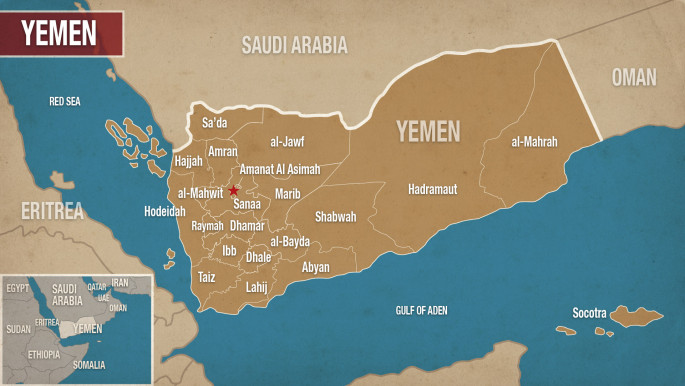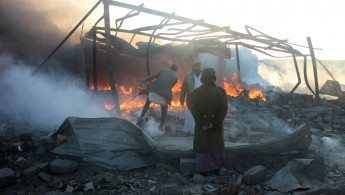Russia's deadly game in Yemen
Yemen's war has raged for three years and shows no immediate sign of ending. Warring factions have done little to gain ground over the other and, after more than 10,000 deaths and an astronomical humanitarian crisis, the conflicting parties are fighting a protracted stalemate within an increasingly destroyed country.
As the war drags on, it is increasingly clear that no military solution can end the conflict. Only diplomacy can achieve this. Yet no single power has yet acted to facilitate this.
Will Picard, executive director of the Yemen Peace Project, claims that outside powers responsible for stoking the conflict - including the UK and the US - have neglected their responsibilities for making peace.
"That none of these actors are doing any of these things tells us everything we need to know about how serious they are about peace, and how little they care about the Yemeni people," said Picard.
With Saudi Arabia's Crown Prince Mohammad bin Salman's travels to Britain and the United States this month, the Washington Institute claimed that it will be a priority of Western leaders to address the coalition's actions in Yemen, and push the kingdom to change course.
Yet given the impunity given to the coalition by both nations, with Britain reportedly increasing weapons sales and blocking UN investigations into Yemen, there is little reason to believe either will make peacemaking in Yemen a priority.
That no global power has tried to restore peace has left a void, which Russia appears to be looking to fill. Early on in the conflict, Moscow kept a close eye on Yemen, and positioned itself as a potential leading mediator in the crisis.
 |
|
In January, Russian foreign minister Sergei Lavrov stated the need to bring a diplomatic end to Yemen's war.
"It is essential that the participants in the conflict give up their attempts to solve the existing problems by force," he insisted.
Moscow would engage with all sides to help the situation "move from a military scenario to a political dialogue", added Lavrov.
Lavrov last week called for the international community to encourage more dialogue with all sides, in an interview with The Reporter.
More significantly, its vetoing of a British-led UN Security Council resolution over Yemen last week - which critics say was too harsh on Iran and the Houthis, and too favourable towards the Saudi-led coalition - shows that Russia is taking a more direct stance on Yemen.
It also shows that the West's policies in the Middle East - which in this case have echoed the Saudi line of needing to curtail Iran's influence in Yemen - have once again been foiled by Russia.
Russia's stronger position in Yemen is indicative of a shifting power balance in the Middle East. Russia has overwhelmingly outmanoeuvred the United States in Syria. Overall, Moscow's presence is expanding.
Russian President Vladimir Putin has shown himself to be an opportunist in the past and would conceivably use Yemen to expand his own influence.
 |
It's hard to imagine that Russia is concerned with making peace, and much more likely that Putin wants to find a way to use the chaos in Yemen to his own advantage |  |
Oleg Ozerov, deputy director of the Africa department at Russia's Ministry of Foreign Affairs, believes that Russia looks to take a stronger stance in Yemen and could therefore take responsibility in leading negotiations to end Yemen's crisis - while involving the West in negotiations too.
It would be easy for Putin; Russia has increasing leverage with Saudi Arabia. Last month, both countries strengthened ties after signing a significant energy deal. This follows the significant rapprochement between Moscow and Riyadh last year, highlighting strengthening bilateral relations.
Meanwhile, Russia has played a balancing act by supporting the Houthis, having in the past abstained from UN resolutions to block weapons transfers to the rebels, while also claiming Houthi rocket fire into Saudi Arabia is a matter of "self-defence". Moscow has also sent aid into Houthi areas, which were neglected by the Saudi-coalition and its backers.
All this takes place while Russia ostensibly supports the UN-recognised Hadi government, which is backed by Saudi Arabia. Across the Middle East, Moscow is asserting its dominance, supporting Iran and Syria, while maintaining good relations with Israel.
Moscow is therefore in a better position than several other global powers to bring an end to the crisis.
There seems to be a degree of support for a greater Russian presence from some Yemeni factions too - notably among Houthi figures and others including Yahya Mohammed Abdullah Saleh, nephew of deceased Yemeni President Ali Abdullah Saleh. The younger Saleh, head of Yemen's Alliance for Progress and Development Organisation, said he was hopeful that Russia could break Yemen's deadlock and bring peace to the area.
Tracing back the footsteps of history of being a power-broker in the region, analysts remember that the Soviet Union supported South Yemen in the 1960s civil war, while retaining good ties with the North.
"Russian leadership has met previously with both Houthi representatives and the Hadi government, so Moscow could conceivably help to facilitate talks," said Picard.
"However, it's hard to imagine that Russia is concerned with making peace, and much more likely that Putin wants to find a way to use the chaos in Yemen to his own advantage," he added.
There has been talk of Russia looking to open military bases in Yemen, while Yemeni bases have been opened to Russian access. Having strong ties with factions on the ground would allow for Russian expansion.
Russia could strengthen itself in the region in other ways. Bloomberg recently reported that Saudi Arabia may invest in the Russian S-400 air-defence system, while shifting away from Western suppliers, showing signs of Russia already benefitting from increased influence.
Yemen's crises present Russia with an opportunity to further expand its influence and once again outmanoeuvre the West. But, as ever, it is the people of Yemen who are being used as playing pieces in the game of geopolitical power.
Jonathan Fenton-Harvey is a freelance journalist.
Follow him on Twitter: @jfentonharvey



